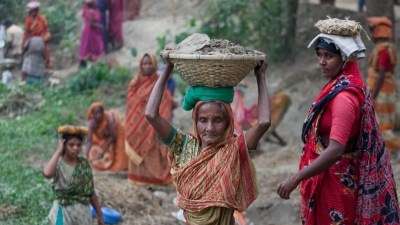ATIMAITHI, Bangladesh – Harimoti Mandal lost her husband earlier this year after a prolonged illness.
“It’s only myself and my two daughters,” she explains. “My husband was sick for a long time and needed treatment. I need to repay those loans.”
Harimoti was able to get back on her feet and keep her family from the brink of disaster through money earned through the Bangladeshi government’s Employment Generation Program for the Poorest (EGPP) supported by the World Bank.
“I’m working now, and I will do my level best so that my daughters can continue their studies so they can get decent jobs,” says Harimoti, a slight woman in a bright green sari dotted with the clay used to repair the roadway she is working on.
She was among 28 laborers – 25 of whom are women – earning 175 Bangladeshi Taka, or $2.14, per day to repair roads running through her community.
Two dollars a day wouldn’t buy the average American’s mocha latte at the neighborhood Starbucks. But this wage allows participants to put food on the table and send their children to school. Harimoti’s daily EGPP earnings are more than her husband used to earn running a tiny shop in their local village.
Harimoti and her fellow workers use picks to chip away at the clay they use for the repairs. They pile the mud into straw baskets which they perch on their hips or balance on their sari-covered heads against the scorching sun as half a dozen bicycle rickshaw drivers doze nearby in the sultry heat and cows chew on discarded corn husks littering the side of the road.
Over and over again they slog barefoot up and down the sides of the steep hill to the road above, tossing the clay onto the two kilometers of roads they are repairing.


